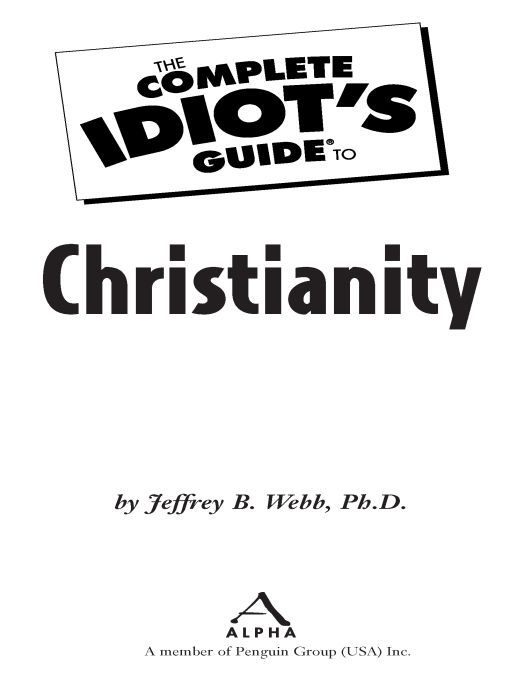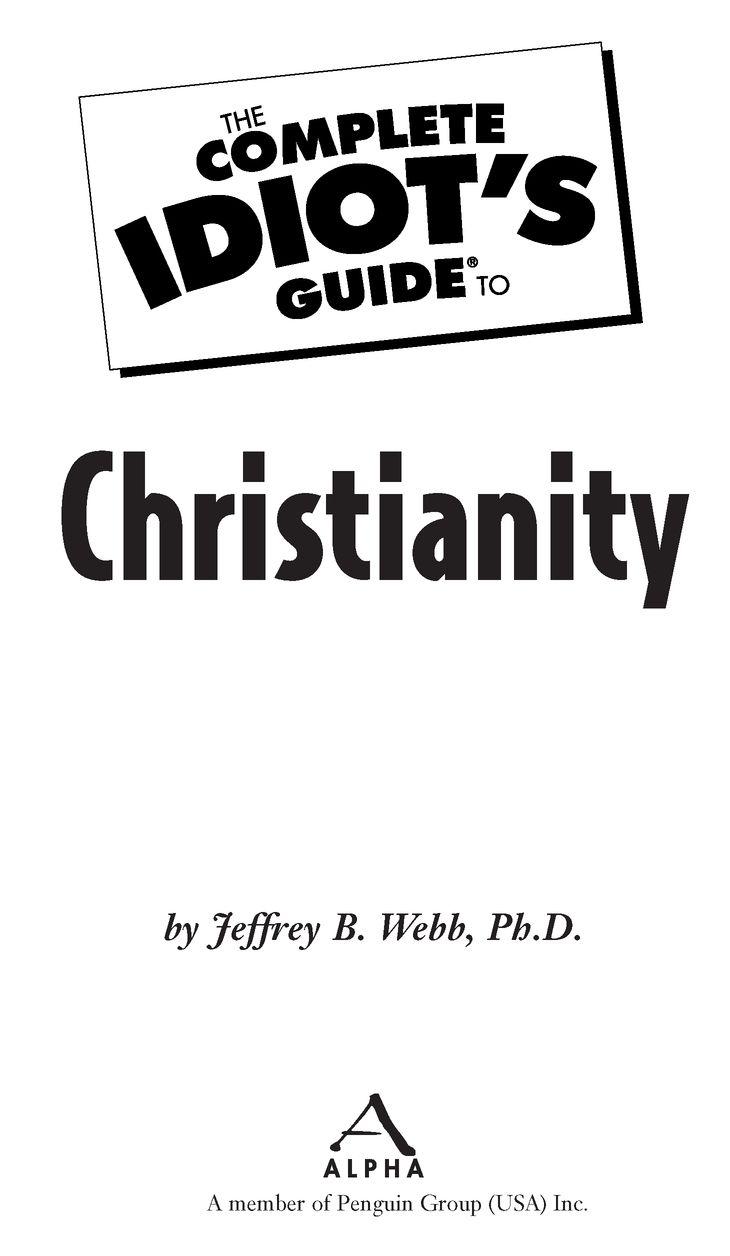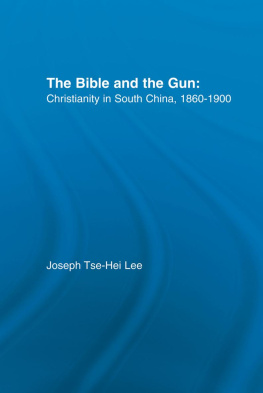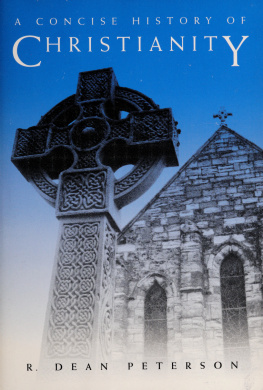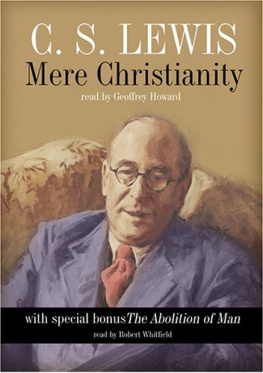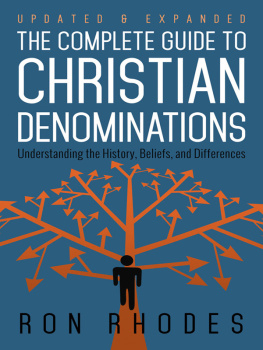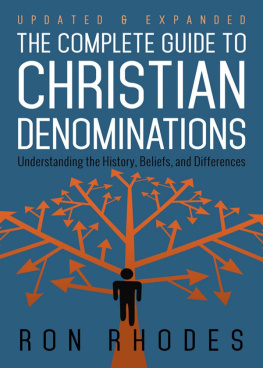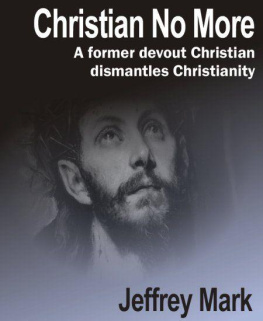Table of Contents
Foreword
A woman kissing icons of Christ and St. Nicholas; teenagers dancing ecstaticallybut in church; a man stammering with excitement in what seems to be a foreign language but what is understood to be the Holy Spirit speaking through him; dark-robed men chanting the psalms; suburbanites rising before dawn to study and pray; professionals filling the trays of hungry neighbors in a basement soup kitchen; people maintaining vegetarian diets; pilgrims fingering beads of the rosary at a shrine where the Virgin appeared; adults being immersed three times; citizens protesting the American military action in Iraq, visiting AIDS patients with meals, both applauding and condemning the consecration of an openly gay man as a bishop; an enthusiastic congregation shouting approval to an even more enthusiastic preacher whose sermon grows and bursts into song; young and old alike seeking healing through anointing and the laying on of hands
What could these and numerous others have in common? They do not agree on the organization of their communities of faith, on the veneration of the Virgin Mary and the saints, on the role of bishops or the pope, on the place of women in leadership positions, but they share communion bread and wine in great ceremonial splendor as well as in simplicity and silence. Who are they? Jeffrey Webb knows who they are and introduces them to usthe amazingly diverse, colorful, sometimes disappointing and sometimes encouraging people called the Christians.
Given its title, in the now well-known series of books for idiots, one might think such a guide was intended only for outsiders, those without any personal or formal knowledge of the Christian faith, tradition, and its history and many expressions here in America. However, when you have worked through this lucid, witty, and insightful overview, you will have become an insider. You will have not only an accurate idea of what Christianity teaches, how Christians organize themselves and worship, even how they both agree and disagree with each otherin both the simplicity and complexity of all thesebut you will also have the perspective of someone within the Christian tradition. An insider himself, Professor Webb, who teaches at Huntington College, is a member of the Presbyterian Church in the United States, serving as an ordained elder in his home congregation.
I suppose I am myself an insider, too, as a scholar, a professor at a large public college, a priest in the Orthodox Church, and yes, a baptized, believing, and I think practicing Christian. As an insider, more often than not I find that even academic specialists dont always get it right when it comes to the precise feel, touch, taste, even smell of lived Christianity. This is especially true regarding my own part of the Christian churches, the Eastern Orthodox. Webb not only gets Orthodox Christianity right, he gets all the other many expressions exactly right as well, from the Roman Catholics to the Protestant mainline (the Lutherans, Episcopalians, Methodists, among others, and his own Reformed churches) to the radical Reformation churches (Mennonites, Hutterites, Brethren) as well as the many varieties of Baptist, Evangelical, and Holiness churches. Why is it that these churches, located along the once prestigious mainline of the old Pennsylvania Railroad, have fallen prey to the passage of time, just as this great line has? Why is it that the U.S. is home to so many religious groups, American originals such as the Mormons, Christian Scientists, Unitarians, Jehovahs Witnesses, and the Seventh-day Adventists? Another homegrown and powerful group, the Pentecostals, appear to be the coming form of Christianity both here and in the booming Christian communities of Africa and Asia.
This guide, no pun intended, will be a revelation to readers who know these groups only as labels. It will make readers insiders themselves to the surprising people here and worldwide who differ in many things but are held together by the person of Jesus Christ. It informs but more importantly welcomes you into the communities, the worship and work, the beliefs and stories of the Christians. One early Christian named Philip, when asked if anything good could come from Nazareth, Jesus home-town, said, Come and see. (Gospel of John 1:45-46) The reader is similarly invited here. You will experience Christianity as you never have before.
Rev. Michael Plekon, Ph.D.
Rev. Michael Plekon, Ph.D., has taught courses on the history of Christianity, the sociology and history of religion in America, and others for twenty years at Baruch College of the City University of New York. He specializes in several aspects of contemporary Christianity, including the Danish theologian Sren Kierkegaard and twentieth-century Russian migr theologians such as Paul Evdokimov, Mother Maria Skobtsova, Alexander Schmemann, and Nicolas Afanasiev. A priest in the Orthodox Church, he has also served in the ordained ministry for over twenty years.
Introduction
You can be excused if youre baffled about the Christian faith. Sometimes it confuses me, too. I cant count the number of times I had to grab an encyclopedia or handbook, or scroll through a website, to find a short description of Eastern Orthodoxy, Quakerism, or Lutheranism. In fact, when he learned I was working on this book, one of my Ph.D.-holding colleagues asked what a Methodist believes.
This book tries to answer two questions: (1) Why are there so many different groups under the umbrella of Christianity? and (2) How do they differ from one to the next? The answers are not easy to state in simple terms. If they were, you wouldnt find so many long books that attempt to describe the various factors at work. Maybe we shouldnt be so surprised. Christianity is the chief means by which a billion people find answers to the most important questions of life: How did we get here? Whats the purpose of life? Why is there so much suffering in the world? Where are we headed? Questions so deep and powerful result in a very complicated set of beliefs and practices.
So in your hands you have a snapshot of Christianity, not only of its different parts, but also how the different parts come together to make a larger whole. Keep in mind that Christianity is a complex faith and snapshots tend to flatten out the picture. And keep in mind that Christianity is a moving target that changes with each passing month and year. Needless to say, snapshots have to be satisfied with a picture frozen in time. But enough hemming and hawing. Were ready to tackle the big stuff here, starting with the question, How does it all fit together?
Think of how a language works. Languages have a common root and numerous branches. The roots of the English language lie in ancient times, with Latin, and then later with the Germanic tongues spoken by tribes that came into contact with the Roman Empire. English evolved from Anglo-Saxon to Middle English after contact with the French, but then morphed into the Shakespearean dialect we know from Hamlet and Midsummer Nights Dream. Todays English differs in shape and content from the English spoken and written in the past. Thats to say nothing of the many dialects and accents that youll discover as you move from London to Manchester, and from New York to Melbourne. Or even from Boston to Brooklyn, and from Wheeling to San Francisco, for that matter.
With languages, youll find experts who write dictionaries and grammatical guides to explain the proper mode of expression, or to bracket the acceptable range of meanings. Youll also find purists who complain about the dialects and accents that distort the form of language theyve come to see as correct. But try as they might, they cant contain the changes to language as it moves through time and meets new environments.

